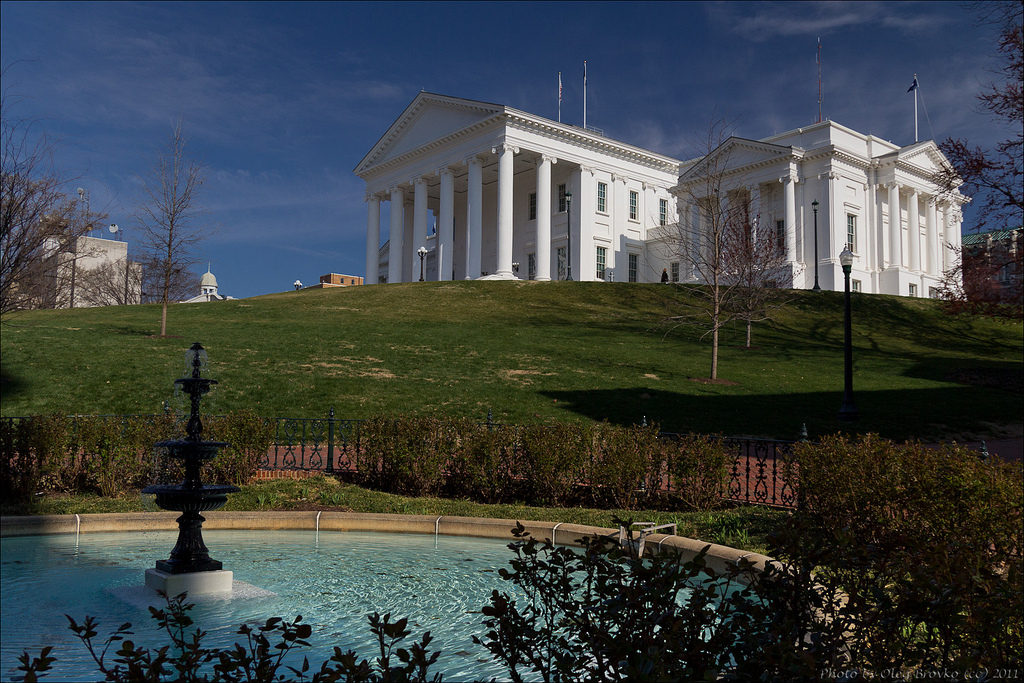Following Virginia’s record-level tax collections this year due to the Republican-led congressional overhaul of the federal tax code, the windfall has become one of the most contentious topics just two weeks away from the January 9 beginning of the 45-day 2019 General Assembly session on Bank Street in Richmond. While Republicans are pushing to re-conform the state’s tax code to allow for people to keep more of the money they earn, Democrats are pledging billions more in total spending paid for with a $1.2 billion tax hike on over 600,000 middle-class taxpayers.
In his recent 2019 budget proposal unveiled in front of legislators at a meeting in the state capitol, Governor Ralph Northam‘s (D) plan would increase government spending by $2.2 billion dollars, including $1.6 billion in recurring spending commitments that will continue after his term as governor expires in 2021. Not only will the plan control the executive branch of future Virginia governors, but it will lock in middle-class tax hikes for years.
With the billions in extra government money to be spent, Governor Northam is looking to make the earned income tax credit (EITC) refundable, which, as some say is tantamount to a “welfare bonus,” a majority of Virginians oppose. However, the refundable EITC program represents only about 20 percent of available funds. The other 80 percent would be used under the governor’s plan to expand other programs like, among others, Medicaid, which just hit the state budget with massive cost overruns.
In September 2018, POOLHO– USE and Cygnal conducted a poll on Virginians about the state tax windfall, finding that 60 percent of residents in the Commonwealth preferred a plan proposed by Republicans in the House of Delegates that would return taxes to middle-class citizens by allowing them to keep existing state tax itemizations by altering the tax code to mirror the federal code. Just 29 percent of respondents supported Northam’s plan of direct payments to low-income families who qualified for the EITC.
Mason-Dixon Polling & Strategy has also conducted a poll recently by asking a question posed by the Thomas Jefferson Institute for Public Policy surrounding the additional state revenue that is proposed to be spent on government programs by the Northam Administration due to Virginia’s “sometimes antiquated” tax code. They asked, considering the changes in federal tax law from the Tax Cuts and Jobs Act will result in a two-year Virginia state revenue increase of $1.2 billion, should the Commonwealth use the additional tax money to expand funding for current state programs, or return the money to 2.8 million middle-class Virginia taxpayers by doubling the state’s standard deduction for individuals and couples?
The findings revealed that 59 percent of respondents preferred returning the increases in state revenue to taxpayers by doubling the state’s standard deduction, with just 29 percent preferring the state spending the money, and 13 percent unsure.
Interestingly, the results mirror the similar, aforementioned poll conducted just over three months ago. So, what the findings of the two official polls show is that a wide majority of the state population dislikes Northam‘s progressive fiscal agenda.
It is also important to note that the poll was not taken by 100 white, middle-aged men living in the coalfields of Southwest Virginia. In fact, out of the 625 polled from December 14-18, when it comes to age, 17 percent of respondents were aged 18-34, 27 percent were aged 35-49, 31 percent were aged 50-64, and 24 percent were aged 65 and above. Also, 52 percent of respondents were female, and 48 percent were male. The three top ethnic groups were Caucasians with 68 percent, African-Americans with 21 percent, and Hispanics with five percent. In terms of political party registration, the poll was taken by 41 percent Democrats, 30 percent Republicans, and 29 percent Independent or third-party voters.
As for the regional distribution of people throughout the state – an issue that has a heavy influence on statewide elections – there was a fair spread of the locations of respondents throughout the state, with 27 percent in Northern Virginia, 20 percent in Hampton Roads, 15 percent in Shenandoah/Piedmont, 14 percent in the Richmond metropolitan area, 12 percent in Lynchburg/Southside, and 11 percent in Roanoke and Southwest Virginia.
The Thomas Jefferson Institute added in the conclusion of their analysis:
“Support for returning the money cut across all voter categories: 68 percent of Republicans, 59 percent of Democrats, 48 percent of Independents, 61 percent of white voters, 52 percent of black voters, 68 percent of men, and 51 percent of women. Support was also geographically diverse, with support ranging from 53 percent in Richmond Metro area to 65 percent in Lynchburg/Southside region.”
Therefore, it is not just Republican lawmakers who want the state tax code conformed to the federal code to allow for middle-class Virginians to keep more of the money they earn – it is a vast, diverse amount of the state that wants a bit of fiscal conservatism governing the state budget.
Recently, the 168-page “State of the Commonwealth” report said that if “Virginia is to continue to improve its economic fortunes, then it must address its sometimes antiquated tax system.”
If the standard deduction is doubled – to $6,000 for an individual and $12,000 for a couple – the institute says the change would return about $440 million per year of the additional taxes to middle-class taxpayers that were generated by federal tax reform. Considering the Republican majority in the General Assembly is touting a simple tax policy change of just that – it is time to act as that is clearly what Virginians want.

